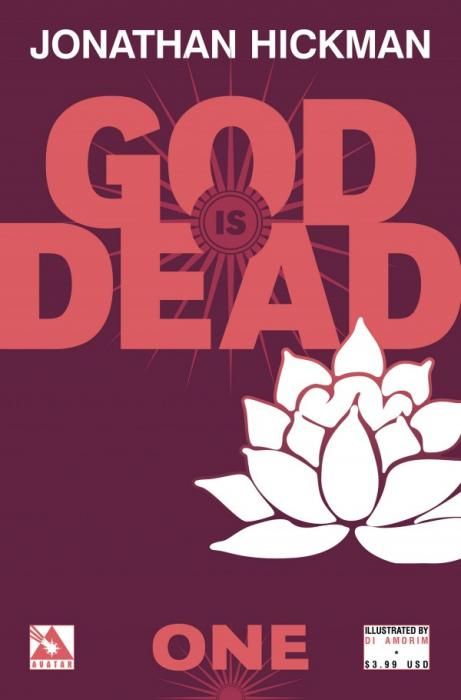In "God is Dead" #1 by Jonathan Hickman, Mike Costa and Di Amorim, the ancient gods are back, bringing with them a trail of disasters and atrocities. The action is divided among three groups: the gods, a resistance movement unimaginatively named The Collective, and the larger civilian reaction.
Hickman and Costa's most original plot points revolve around the larger drift of culture and society in the wake of the return of ancient gods. Near the middle of "God is Dead" #1, there are two facing pages, each spotlighting a man on TV. On the first page he is a newscaster, staunch about the mission of the Fourth Estate in promoting Objective, Rational Facts. On the second page, the man is a prophet, speaking non-denominationally about uncertainty, prayer and the path to enlightenment. Hickman and Costa give each speech some emotional flair. This even-handedness is a welcome touch of subtlety. It also introduces the theme of Science vs. Faith, or the Age of Enlightenment vs. The Dark Ages, but the writers hold off on addressing that controversial debate in "God is Dead" #1, despite the title.
Speaking of the title, the gods are alive and back, not dead. It's uncertain what the point of the series title is, other than provocatively reference Nietzsche and to foreshadow the likely endgame. In plot structure, "God is Dead" #1 is an alien invasion story: They're here! They're breaking some noses! They want to take your home away from you! The "End of Days" near-apocalypse conceit is only window-dressing to showcase spectacles of disaster. The world isn't ending; it's just being re-conquered.
"God is Dead" #1 ends on a sexual analogy of such conquest. It's locker room talk, where the intent may be to shock, but the effect is undermined by immaturity and mundanity. The final page points towards a simplistic Humans vs. Gods showdown, which will probably end in a David vs. Goliath situation in which the puny human scientists triumph in sending the Gods to Valhalla, Mount Olympus and variously back from whence they came.
Characterization in "God is Dead" #1 is uniformly weak. In Ancient Greece, Zeus was known the leader of the gods, but he was also deliberately characterized as philandering, impulsive, and like the rest of his cohort, often moody, foolish, capricious and cruel. In "God is Dead" #1, Zeus is reduced to being a powerful and pissed-off grandpa on too many steroids.
Sebastian Reed is a standard underdog protagonist who conveniently leads the reader to The Collective. Nothing about him or The Collective is original, including the goth/punk hybrid look the woman who rescues him from street zealots. Despite his technical skill, Amorim's art feels bland. His flow of action is clear, his backgrounds are detailed, and he makes the deities familiar and recognizable, but he fails to put his own spin on them. Their appearances are faithful to reader expectations but lack flair.
It's not a new idea to have neglected gods returning to earth like so many prodigal sons. Similar ideas were handled with much more finesse in Neil Gaiman's "Sandman," and before that, in the novels of Roger Zelazny, among others. Hickman and Costa's combination of ideas has promise, especially in bringing in the science/faith divide angle, but their execution is lacking.
The plotting and characterization are unexciting, and on a deeper level, the narrative choices feel sloppy. Introducing gods from different cultures into one story leads to questions, such as, why Zeus? Why is he the leader, when Odin and other heavy-hitter, central father-figure gods are also in the room? For that matter, if the leader has to be a Western god, why not Hestia, goddess of the hearth, or a trickster god like Hermes?
Unfortunately, the selection of gods and Hickman and Costa's delegation of leadership feels arbitrary. "God is Dead" falls flat in living up to the ambition of its themes, or else it's not trying to achieve any commentary on power and religion. There may be stronger mechanics and a more thoughtful treatment of ideas in future issues, but as a debut, "God is Dead" #1 feels crude.

